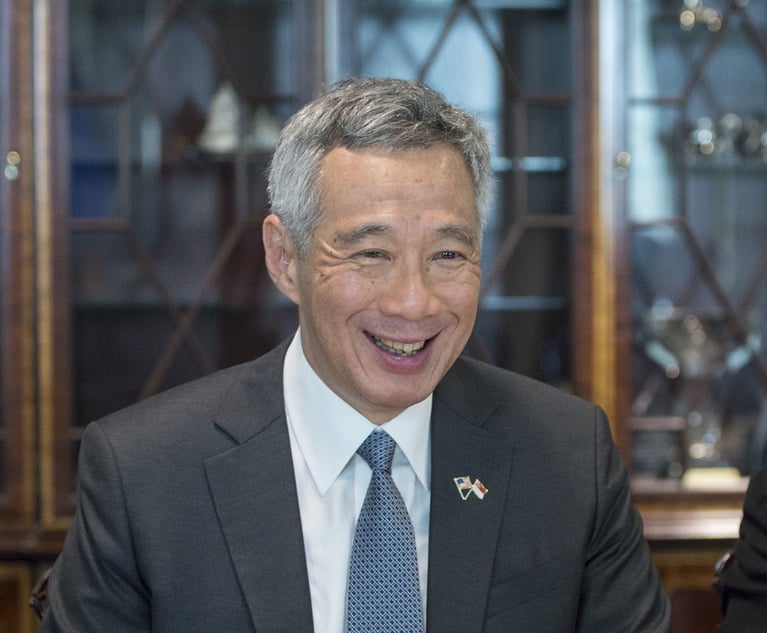Cleary, Squire Sanders and McDermott lead charge of big law firms to Seoul
The past few years have seen China hogging the headlines and boardroom discussions, but as companies adopt a pan-Asian strategy amid slowing Western economies, South Korea has rapidly become the new focus for firms.
September 27, 2012 at 07:03 PM
3 minute read
Four major US firms win backing to practise in Korea as foreign firms push into market
The past few years have seen China hogging the headlines and boardroom discussions, but as companies adopt a pan-Asian strategy amid slowing Western economies, South Korea has rapidly become the new focus for firms.
Four international law firms received approval to open in the country on Wednesday (26 September), with Cleary Gottlieb Steen & Hamilton, McDermott Will & Emery, Paul Hastings and Squire Sanders all getting the go-ahead.
The approvals, which bring the number of licences awarded to nine, highlight the growing importance of Asia's fourth largest economy, and its potential for firms working in the litigation, corporate and intellectual property (IP) sectors particularly.
"Korea has changed quite a bit in terms of its economic landscape," said William Kim, a Seoul-based corporate partner from Ropes & Gray, which opened in Korea this July followed by US outfit Sheppard Mullin and Clifford Chance. "Much of the manufacturing has now gone out of Korea into China and Japan," he added, "and so the types of legal services that are needed are moving more towards IT, telecommunications, consumer electronics, and high tech.
"Life sciences and energy are also important. The government has earmarked these areas for support and investment, both domestic and foreign."
Given the industry shift and the potential for outbound investment, Kim believes the focus for firms will be on IP, M&A and litigation work.
He commented: "M&A is still fairly strong because Korean companies are holding a lot of money for foreign investment, not just financial but strategic."
Ashurst Asia managing partner Geoffrey Green (pictured) agreed. His firm is putting together a four-lawyer team for its own branch in Seoul, which will focus on outbound work from Korean clients into Australia and India.
"Korea is important because it is a developed market with sophisticated users," he said. "These users will be significant because they are continuing to spend money outside of the domestic market."
How the country's legal market will evolve in the future is less easy to gauge. According to Kim, the law firms who are attracted to the market are mainly those servicing Korean clients already, putting a natural limit on competition.
But this could be about to change as figures from the local Ministry of Justice indicate some 16 foreign law firms have applied to set up in Seoul already, with a further nine expected to submit applications before the end of the year.
This content has been archived. It is available through our partners, LexisNexis® and Bloomberg Law.
To view this content, please continue to their sites.
Not a Lexis Subscriber?
Subscribe Now
Not a Bloomberg Law Subscriber?
Subscribe Now
NOT FOR REPRINT
© 2025 ALM Global, LLC, All Rights Reserved. Request academic re-use from www.copyright.com. All other uses, submit a request to [email protected]. For more information visit Asset & Logo Licensing.
You Might Like
View All
Singapore Leaders Stress the Importance of the Rule of Law Amid Geopolitical Tensions

Can Law Firms Avoid Landing on the 'Enemy' List During the Trump Administration?
5 minute read

Letter From Asia: Will Big Law Ever Bother to Understand Asia Again?
Trending Stories
- 1South Florida Attorney Charged With Aggravated Battery After Incident in Prime Rib Line
- 2'A Death Sentence for TikTok'?: Litigators and Experts Weigh Impact of Potential Ban on Creators and Data Privacy
- 3Bribery Case Against Former Lt. Gov. Brian Benjamin Is Dropped
- 4‘Extremely Disturbing’: AI Firms Face Class Action by ‘Taskers’ Exposed to Traumatic Content
- 5State Appeals Court Revives BraunHagey Lawsuit Alleging $4.2M Unlawful Wire to China
Who Got The Work
J. Brugh Lower of Gibbons has entered an appearance for industrial equipment supplier Devco Corporation in a pending trademark infringement lawsuit. The suit, accusing the defendant of selling knock-off Graco products, was filed Dec. 18 in New Jersey District Court by Rivkin Radler on behalf of Graco Inc. and Graco Minnesota. The case, assigned to U.S. District Judge Zahid N. Quraishi, is 3:24-cv-11294, Graco Inc. et al v. Devco Corporation.
Who Got The Work
Rebecca Maller-Stein and Kent A. Yalowitz of Arnold & Porter Kaye Scholer have entered their appearances for Hanaco Venture Capital and its executives, Lior Prosor and David Frankel, in a pending securities lawsuit. The action, filed on Dec. 24 in New York Southern District Court by Zell, Aron & Co. on behalf of Goldeneye Advisors, accuses the defendants of negligently and fraudulently managing the plaintiff's $1 million investment. The case, assigned to U.S. District Judge Vernon S. Broderick, is 1:24-cv-09918, Goldeneye Advisors, LLC v. Hanaco Venture Capital, Ltd. et al.
Who Got The Work
Attorneys from A&O Shearman has stepped in as defense counsel for Toronto-Dominion Bank and other defendants in a pending securities class action. The suit, filed Dec. 11 in New York Southern District Court by Bleichmar Fonti & Auld, accuses the defendants of concealing the bank's 'pervasive' deficiencies in regards to its compliance with the Bank Secrecy Act and the quality of its anti-money laundering controls. The case, assigned to U.S. District Judge Arun Subramanian, is 1:24-cv-09445, Gonzalez v. The Toronto-Dominion Bank et al.
Who Got The Work
Crown Castle International, a Pennsylvania company providing shared communications infrastructure, has turned to Luke D. Wolf of Gordon Rees Scully Mansukhani to fend off a pending breach-of-contract lawsuit. The court action, filed Nov. 25 in Michigan Eastern District Court by Hooper Hathaway PC on behalf of The Town Residences LLC, accuses Crown Castle of failing to transfer approximately $30,000 in utility payments from T-Mobile in breach of a roof-top lease and assignment agreement. The case, assigned to U.S. District Judge Susan K. Declercq, is 2:24-cv-13131, The Town Residences LLC v. T-Mobile US, Inc. et al.
Who Got The Work
Wilfred P. Coronato and Daniel M. Schwartz of McCarter & English have stepped in as defense counsel to Electrolux Home Products Inc. in a pending product liability lawsuit. The court action, filed Nov. 26 in New York Eastern District Court by Poulos Lopiccolo PC and Nagel Rice LLP on behalf of David Stern, alleges that the defendant's refrigerators’ drawers and shelving repeatedly break and fall apart within months after purchase. The case, assigned to U.S. District Judge Joan M. Azrack, is 2:24-cv-08204, Stern v. Electrolux Home Products, Inc.
Featured Firms
Law Offices of Gary Martin Hays & Associates, P.C.
(470) 294-1674
Law Offices of Mark E. Salomone
(857) 444-6468
Smith & Hassler
(713) 739-1250








